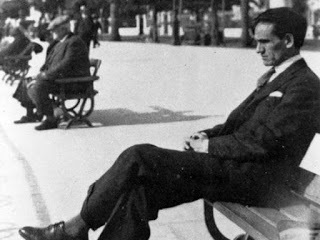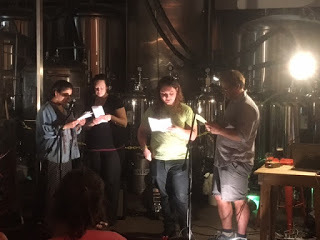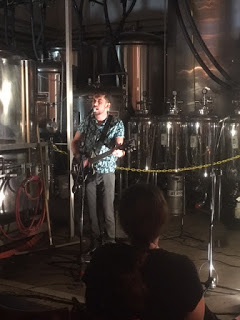Reading is Resistance: Take This Cup from Me Performance
 In some ways, it was an idle thought, a passing observation, an idea that would be pretty obvious to just about anyone who was looking, but still, it caught in my brain as these things sometimes do. Pretty much since I first encountered Cesar Vallejo in an anthology edited by Clayton Eshelman called Conductors of the Pit, I knew I wanted to write a book about him. Eventually, I decided that I wanted to focus on just ten poems and call the book “10 Poems by Vallejo” even though I had (have) no idea what form or angle the book might take. Finding myself in between projects, I started typing up the ten poems I'd selected, including “Spain, Take this Cup from Me.” Said idle thought passed through my mind; there were some interesting and potentially enlightening parallels between the Spanish Civil War Vallejo wrote about and our current resistance to the Trump administration (and the notes of our own civil war playing in the background). I started thinking about how we could use Vallejo's poem to explore our own political turmoil. And, I wrote this post on Facebook:
In some ways, it was an idle thought, a passing observation, an idea that would be pretty obvious to just about anyone who was looking, but still, it caught in my brain as these things sometimes do. Pretty much since I first encountered Cesar Vallejo in an anthology edited by Clayton Eshelman called Conductors of the Pit, I knew I wanted to write a book about him. Eventually, I decided that I wanted to focus on just ten poems and call the book “10 Poems by Vallejo” even though I had (have) no idea what form or angle the book might take. Finding myself in between projects, I started typing up the ten poems I'd selected, including “Spain, Take this Cup from Me.” Said idle thought passed through my mind; there were some interesting and potentially enlightening parallels between the Spanish Civil War Vallejo wrote about and our current resistance to the Trump administration (and the notes of our own civil war playing in the background). I started thinking about how we could use Vallejo's poem to explore our own political turmoil. And, I wrote this post on Facebook: Writerly, readerly friends, especially poets or those poetic inclinations. I'm kicking around a project that might become an event or might become something else (anthology, chapbook, who knows.) It involves rewriting a poem about and inspired by the Spanish Civil War by the Peruvian poet Cesar Vallejo. So, if you're a fan of Vallejo and fighting fascists and might be interested in participating, comment or send me a message. Right now, I'm just gauging interest. Thanks.
And writerly, readerly friends responded. I'm still a little blown away, but, then again, Vallejo kicks serious ass. The first result was a translation and response event called Take This Cup from Me, in The Late Night Poetry Lab reading series the bookstore hosts at Aeronaut brewing.
Throughout the event, a slideshow juxtaposing images from the Spanish Civil War and the political turmoil of the last year or so, played. What struck me about these juxtaposed images was the similarities and differences in the energies of the people in the pictures. There was a vibrancy in most of the images from both eras. Even if that volume of energy was driven by anger as it was at Trump rallies, there was a volume to the emotions that was thrilling. But there was something different in the eyes of the people in the images that were clearly from later in the Spanish Civil War. I was paying attention to too many other moving parts (like getting the slideshow to actually work) to really identify what I saw in those eyes; maybe a kind of exhausted defiance, maybe just exhaustion, maybe something else entirely, but it is clear something happens to people over the course of a long struggle. And, I suspect, regardless of what happens with Trump himself, we're going to find out what it is.
 The main event of the evening was what I called a cascading line by line translation. Reading one line at a time, the poem was performed first in the original Spanish and then in three different English translations, Eshelman, Gerard Malanga, and an original translation made for the event by Maria Jose Gimenez and Anna Rosenwong. This let us hear some of the different ways Vallejo's Spanish could be rendered in our English and it was fascinating. Sometimes the differences were subtle, some of the differences were drawn from the strangeness and complexity of Vallejo's vocabulary and imagery, and some were, in the moment at least, inexplicable to me. More than a few times I had to remind myself to focus on the line I was about to read rather than the differences in the lines I'd just heard.
The main event of the evening was what I called a cascading line by line translation. Reading one line at a time, the poem was performed first in the original Spanish and then in three different English translations, Eshelman, Gerard Malanga, and an original translation made for the event by Maria Jose Gimenez and Anna Rosenwong. This let us hear some of the different ways Vallejo's Spanish could be rendered in our English and it was fascinating. Sometimes the differences were subtle, some of the differences were drawn from the strangeness and complexity of Vallejo's vocabulary and imagery, and some were, in the moment at least, inexplicable to me. More than a few times I had to remind myself to focus on the line I was about to read rather than the differences in the lines I'd just heard.The cascading line by line translation was followed by a number of responses to Vallejo's piece. A poem by Epi Arias was performed in both Spanish and English. Then, I performed my original line-by-line response to Eshelman's translation (posted below).
Perhaps my favorite part of the event was that, through Chris Boucher, I was able to connect with Jean-Christophe Cloutier, who recently translated some works by Kerouac, and get my response translated into Quebecois French. I grew up in Lewiston, a French-Canadian mill town in Maine, and, though I have plenty of Quebecois heritage (including a great uncle who played hockey against/with Maurice Richard once) I don't feel as though I have a particularly strong connection to it. Getting my poem translated into Quebecois interacted with the theme of the event and strengthened this connection for me. Furthermore, it was fascinating to hear my work in another language. Even without being able to speak French (Quebecois or otherwise), it was clear that this translation brought out an anger, that, in the English original, was under the surface and between the lines. What was a kind of exasperated frustration, a long sustained, “Guys, seriously, come on,” became a glorious spittle-flecked rant, a kind of linguistically hallucinogenic “These fucking guys!” (There was also something truly beautiful about listening to this angry Quebecois poem echoing around a bar.)
But that is, of course, the power of translation. Translating a work from one language to another, in essence creates an entirely new work that is in direct conversation with the original, highlighting and illuminating aspects of the ideas in the original that its original language was unable to express. In many ways, our ability to express ourselves in words is fundamentally limited by the language we use, a language (any and every language) that simply cannot contain and transmit all of our complexities. Every time the idea is translated into another language a different aspect of it is revealed. Which leads me to a kind of Borgesian idea; that the only truly complete thought is one that has been translated into every human language that has ever or will ever be spoken.
Next Alyeda Morales read an original response in Spanish and did a fantastic job. Not speaking Spanish, I only understood the occasional word here and there. (OK, that occasional word was “gringo.”) Which got me thinking. I, personally, love hearing people speak languages I don't know. Maybe it's because, as a writer I have an inherent interest in language, maybe it's because I like to try to figure out what people are saying, or maybe it's because, as a poet, I'm interested in the mechanics of the sound of language. Regardless of why, one of my favorite parts of living in a city is listening to conversations in languages I don't understand. (Which makes me wonder what a sociological study examining how people react to overhearing a foreign language would reveal.)
 Given that there was so much Spanish in this performance and a little Quebecois, for me, and many other audiences members, this was a musical event as much as it was a poetry event, an experience of the sound of the human voice as much as it was an experience of the spoken word. Which meant having singer-songwriter JD Debris close the night with his song “Vallejo,” (which he tweaked specifically for the event) was a perfect way to end the performance.
Given that there was so much Spanish in this performance and a little Quebecois, for me, and many other audiences members, this was a musical event as much as it was a poetry event, an experience of the sound of the human voice as much as it was an experience of the spoken word. Which meant having singer-songwriter JD Debris close the night with his song “Vallejo,” (which he tweaked specifically for the event) was a perfect way to end the performance.Because it was Vallejo's words that started this whole project, I concluded the event by reading this excerpt from Vallejo's essay “The Great Cultural Lessons of the Spanish Civil War” from The Selected Writings of Cesar Vallejo:
But the jurisdiction of thought has its revenge. If the protest cries out loud and clear, and the expression of combat in the flesh truly explodes against the coagulated powers of the economy, then the timeless inflection of an idea from a speech, article, message, or manifestation could be a petard that falls into the guts of the people and explodes into certain incontrovertible outcomes on the day we least expect it. It's by thinking and constructing, without expecting immediate explosive miracles from their present work, and by devoting the maximum spiritual strength and dignity necessary for the social interpretation of contemporary problems...that [intellectuals] exercise influence and have a bearing on the ulterior process of history. And it's especially important for the intellectual to translate the popular aspirations in the most authentic and direct way, worrying less about the immediate...effect on their actions and more about their resonance and efficiency in the social dialectic, since the latter, in the long run, laughs off hurdles of all kinds, including economic ones, when a social leap is ripe for the taking.
And...I've decided that, among other goods the Spanish people's victory over fascism will bring is proof to foreign intellectuals that, although creating an intrinsically revolutionary work in the silence and seclusion of a study is a beautiful and transcendent act, creation is even more revolutionary when it's done in the heat of battle by pulling it from life's hottest and deepest pits.
At time of writing (which, given the pace of our times should be an assumed phrase), Donald Trump is reportedly considering finding a way to fire Robert Mueller, pardoning everyone in his family, and pardoning himself. At the same time, for reasons that really and truly only seem to be a personal vendetta Mitch McConnell has against President Obama, Republicans are trying to destroy the contemporary American healthcare system. A process that started with Nixon's Southern Strategy and intensified under the politicizing of radical Christianity, has culminated in a national, mainstream party enacting and supporting the transformation of the United States of America back into a malignant and overt white supremacist nation. I don't know what the fuck is going to happen next. I mean, we all know how the Spanish Civil War turned out. I don't know if events, acts, and moments like these really help. Well, I know they help me. I know they helped the other performers and I know they helped at least some of the people who attended. And I know that we must fight, both using established techniques and flailing about the vastness of human experience for something that might break through.
Finally, though it can be easy to dismiss poetry performances, acts of art, and other experiments with expressing dissent as impractical or silly, or as alienating to some other population one hopes to ally with politically in 2018, though it can be easy to point to a translation event at a bar and ask how that could possibly influence Senator Susan Collins or whichever other Republican we're hoping might actually act with a modicum of human decency, we need to remember that acts of poetry, acts of art, acts of creative life aren't just acts of resistance or examples of the fight; art, poetry, and creative life are also what we're fighting for.
USA, Take This Cup from Me
White dudes of the USA,if the USA falls—Hey, it could happen—if her torchfalls upon your fraternal scaffolding secured,in a necktie, by waning logistic highways;white dudes, what harvested the corporeality of grounds!how it feels to bear water for the first time!how obvious the tassels of your confidence!how to recuperate without sick days!
White dudes of the USA, motherUSA reveals the army you concealed from yourself;her others once beyond your barbutesshe appears as mother and teacher,training and strength, reside in the muscle fiber,chamber and hammer and competence, white dudes;she arms all soldiers, they remember!
If she falls—Hey, it could happen—if the USAfalls, from the homestead upon,white dudes, how could you possibly win!how by tomorrow you will be yesterday!how your atrophied muscles tremble from others' typical gravityhow the fraternal network smally betrays, the crumbs of the crumbs!How the little league will laughat mocking marionettes made from your filament enhancements!How your auxiliary attachments will be distributedone way or another and abdicating leaves fewer scars!
White dudes,sons of soldiers, meanwhile,ready or not, for with or without you, the USA is changingher gaze into phallus agnostic eyes,body cameras, riots, and people.Ready or not, for sheawokens catastrophically, knowing justwhat to do, and she has in her handsthe legal case, arguing away,the case, the one with the provisions,the case, our argument for!
Ready or not, I tell you,ready or not the white between the print, the whisperof being and the strong reveille of the monuments, and eventhat of your chambers, which walk with two stones!Ready or waiting, and ifthe torch comes down,if the barbutes shrink, if it is lunch,if seams occupy the balance of our logistic highways,if there is potent creaking in the executive joints,if I am late,if they do not regard you, if the barricaded earsstarve you, if motherUSA falls—Hey, it could happen—let go, white dudes of the world, let go of entitled!...
Published on July 23, 2017 19:32
No comments have been added yet.
Josh Cook's Blog
- Josh Cook's profile
- 16 followers
Josh Cook isn't a Goodreads Author
(yet),
but they
do have a blog,
so here are some recent posts imported from
their feed.



